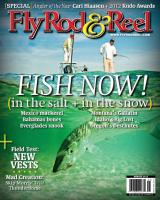 In Fly Rod & Reel’s winter issue I had Ted Williams write about the hatchery steelhead debacle on Washington’s Elwha River. I’d spoken with Jim Schmitz of the Wild Steelhead Coalition and heard the frustration in his voice—we both wondered, why would people ruin with hatchery fish what could have been the greatest steelhead and salmon recovery story in history?
In Fly Rod & Reel’s winter issue I had Ted Williams write about the hatchery steelhead debacle on Washington’s Elwha River. I’d spoken with Jim Schmitz of the Wild Steelhead Coalition and heard the frustration in his voice—we both wondered, why would people ruin with hatchery fish what could have been the greatest steelhead and salmon recovery story in history?
Well, we weren’t alone in wondering about that and the Elwha’s Klallam Tribe heard the voices. Following is a release on an agreement to not place hatchery steelhead into the Elwha River… this year. While this agreement doesn’t secure the future of wild fish on the Elwha, it’s a good sign and I would like to think that Ted Williams and Fly Rod & Reel are part of the reason for this to happen. Read on. Maybe there is a future for the Elwha.
Non-native hatchery steelhead will not be released into the Elwha River and its tributaries this year, say four conservation groups that earlier this month filed suit against federal agencies and officials of the Lower Elwha Klallam Tribe (in their official capacities) for releases of hatchery fish into the Elwha. The groups announced today that they have reached an agreement with the Lower Elwha Klallam Tribe (LEKT), where the four groups agreed not to seek a preliminary injunction against the LEKT’s release of hatchery-raised “Chambers Creek” steelhead, and the LEKT agreed not to release those fish this year. Normally, the fish would have likely been released sometime in April.
On February 9, 2012, the four groups, Wild Fish Conservancy, The Conservation Angler, the Federation of Fly Fishers Steelhead Committee, and the Wild Steelhead Coalition and the Wild Steelhead Coalition filed suit in the US District Court for Western Washington in Tacoma against the Olympic National Park, NOAA Fisheries Service, the U.S. Fish and Wildlife Service, and representatives of the LEKT, alleging violations of the Endangered Species Act (ESA). The agreement READ MORE
